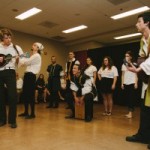Novak and Weigel Discuss Iraq 2003 and Syria 2013
/Two prominent Catholic supporters of military intervention a decade ago outline their stances on intervention, then and now.
Published by Joan Frawely Desmond in "National Catholic Register" on September 19, 2013
WASHINGTON — When President Obama addressed the nation on Sept. 10 to explain his response to a reported chemical-weapons attack in Syria, he vowed not to repeat the mistakes made by his predecessor, George W. Bush, who has been vilified for approving the 2003 invasion of Iraq, which is still mired in political violence a decade afterwards.
Thus the president defended his new two-track Syria policy — which includes an agreement to place President Bashar al-Assad’s chemical weapons under international control — and a backup plan for a “narrow” military strike to deter future use of chemical weapons as evidence of his prudent style of leadership. His remarks sought to tamp down public skepticism by insisting that the intelligence on Assad’s alleged sarin-gas attack was credible and that a modest mission, with no “boots on the ground,” would keep the U.S. out of another foreign war.
But the influential Catholics who once supported Bush’s policy a decade ago possess a different view of that fateful decision to invade Iraq.
Public intellectuals like George Weigel, who has written extensively on the moral and prudential principles guiding the conduct of war, still defend the broader mission of Bush’s policy in Iraq, while critiquing Obama’s present policy on Syria.
George Weigel
Ask Weigel if he has reconsidered his support for the Iraq invasion, and you will get a “No,” with qualifications.
“No, in the sense that I still think it was necessary to compel regime change in Iraq, and the invasion was the only way to do that,” Weigel told the Register.
“There were obviously a lot of things that could have been done better in securing the peace after the regime fell,” he acknowledged, in a reference to the Bush administration’s inadequate planning for both an ongoing jihadist threat and the costs of rebuilding a battered nation.
“But anyone who thinks that the world or the Middle East would be better in 2013 with Saddam Hussein in power in Baghdad, having re-ramped-up his WMD [weapons of mass destruction], is living in a fantasy world.”
Weigel supported Bush’s plan to disarm Iraq’s alleged stockpile of WMDs and secure a democratic peaceful system of government as worthy ends for military intervention, reflective of Washington’s unique role in world affairs.
“Right intention is a specification of a legitimate public authority's duty to do what is good, which in the case of war does not end with repelling evil but includes the duty to build the peace of tranquillitas ordinis, the peace of a just public order,” Weigel noted in a 2007 essay that celebrated U.S. efforts to secure democracy in Germany, Italy and Japan after the Second World War.
Given his belief that a proper evaluation of proposed military action should begin with the question (Will it “build the peace”?), Weigel was unlikely to be satisfied with the narrow scope of Obama’s policy for Syria.
In a Sept. 13 column posted on National Review Online, Weigel argued that “the refusal to define the appropriate end — a Syria (in whatever form) safe for its people, posing no threat to its neighbors and detached from the evil purposes of both the Iranian regime and various jihadists — has led to the absurd situation in which the goal of U.S. policy has been reduced to the defense of a ‘norm,’” a reference to Obama’s statement that Assad’s unlawful lethal sarin-gas attack had crossed a “red line.”
Michael Novak
Michael Novak, perhaps the most visible Catholic intellectual backing Bush’s policy of pre-emptive war, expressed similar concerns about Obama’s Syria policy, while defending Bush’s past effort to neutralize Hussein’s use of WMDs and effect democratic change in Iraq.
“I thought it would be inexcusable for an American president, knowing what was public knowledge [on Iraq’s WMD program], not to act to some degree,” Novak told the Register.
“I thought then that it was really important to turn the attention of Muslim youth, especially young males, away from destruction and toward using their own talents and building a more humanistic human-rights-supporting version of Islam.”
Turning to Syria, now in its third year of an entrenched civil war, Novak expressed a lack of confidence in Obama’s response to the political violence sparked by the Arab Spring uprisings.
“One hundred thousand people have been killed in Syria, and the rebels are much weakened,” said Novak, who said the president “missed the opportunity” to influence the direction of a popular uprising against the Assad regime.
He also noted Pope Francis’ outspoken opposition to U.S. military intervention in Syria and recalled Pope John Paul II’s passionate call for Washington to set aside its plans for a U.S. invasion of Iraq.
“Different people have different roles. It was the role of Pope John Paul to be against the war, so it would not be turned into a religious war. The same is true today: [The Pope does not want the Syrian civil war] to turn into a Christian-Muslim war.”
In fact, in the weeks before the U.S. launched the Iraq invasion, Novak sought to influence the Holy See’s view of U.S. policy, traveling as a private citizen to the Vatican to give a public address at the invitation of the U.S. ambassador to the Holy See, Jim Nicholson.
In his Vatican address, Novak suggested that the post-9/11 world of “asymmetrical warfare” — the capacity of a terrorist group or a rogue nation to inflict grave harm on a more powerful enemy like the U.S. — required a flexible approach to the application of just-war criteria, a moral framework for evaluating the purpose and conduct of war.
Unfulfilled Objectives
In the years following the invasion, Catholics who once supported that decision have been candid about the failure of the Bush administration to fulfill the “noble” promise of regime change.
“Accelerating the transition to responsible and responsive government in the Arab Islamic world was the grand strategic idea that impelled the United States” to intervene in Iraq, Weigel wrote in a 2007 article in First Things.
“The implementation of that idea has been, in many respects, a failure thus far; but the idea itself was a noble one.”
In Weigel’s view, that mission was at least in keeping with the United States’ legacy as a defender of freedom across the globe, while Obama's sharply limited goal was unworthy of the nation's historic role.
At present, his opposition to Obama’s policy has prompted some of the president’s allies to raise questions about the motives of Catholic public intellectuals who backed Bush’s mission to take control of Hussein's reported WMDs but won’t lend their support to a plan designed to stop Assad’s alleged use of WMDs.
“The situation in Syria is not a potential threat to innocents, as was the case with Hussein in 2003. It is ongoing slaughter taking place before the eyes of the world,” said Stephen Schneck, director of the Institute for Policy Research & Catholic Studies at The Catholic University of America.
“Despite that slaughter, very few prominent Catholic conservatives support the Obama administration’s request for authorization to intervene,” Schneck, who is a former board member of Democrats for Life of America, told the Register.
“I’d like to think that’s because they have learned from Iraq about appropriate application of the Church’s just-war teachings. It would be sad if their interpretations merely changed with the occupancy of the Oval Office.”
The debate on Capitol Hill and among Catholic scholars will likely continue for many weeks and months to come. For the moment, as Washington awaits the outcome of the agreement to place Syria’s WMDs under international control, Weigel has suggested that lawmakers launch “a root-and-branch reconsideration of Syria policy, as to both ends and means.”
And while opinion polls have discouraged Congress from authorizing any military action that could embroil the U.S. in a widening regional conflict, Weigel believes that the nation cannot afford to retreat from the challenges that loom beyond its borders. Lawmakers, he said, must “remind the American people of some hard home truths: that isolationism … is both strategically dangerous and morally unworthy; that a great power cannot lead from behind.”
Joan Frawley Desmond is the Register’s senior editor.
Copyright © 2013 EWTN News, Inc. All rights reserved.





 Then, too, one dare not overlook the superabundance of talent at Ave Maria, especially among the young women. So rich is the female talent that a full second cast of the lead parts for women took its turn over the three weeks of performances. Each one of the second cast kept the joy of the play alive when her chance came, particularly Leslie Nagel, who played an entirely different Beatrice, to great and moving effect.
Then, too, one dare not overlook the superabundance of talent at Ave Maria, especially among the young women. So rich is the female talent that a full second cast of the lead parts for women took its turn over the three weeks of performances. Each one of the second cast kept the joy of the play alive when her chance came, particularly Leslie Nagel, who played an entirely different Beatrice, to great and moving effect.